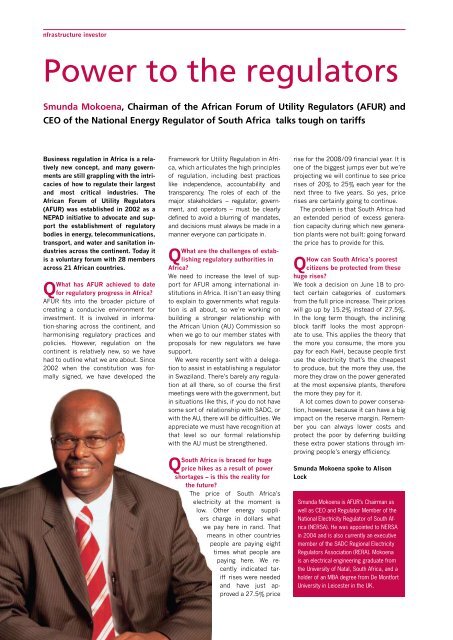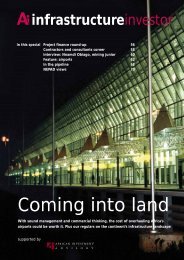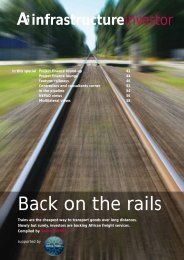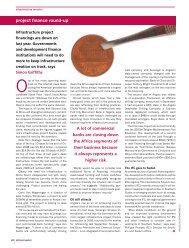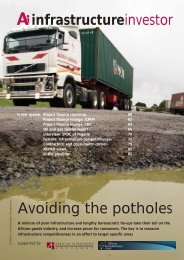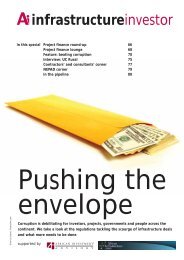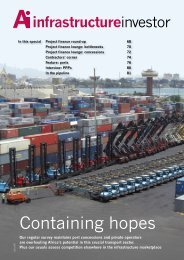Tower of power - Simon Griffiths
Tower of power - Simon Griffiths
Tower of power - Simon Griffiths
You also want an ePaper? Increase the reach of your titles
YUMPU automatically turns print PDFs into web optimized ePapers that Google loves.
nfrastructure investor<br />
Power to the regulators<br />
Smunda Mokoena, Chairman <strong>of</strong> the African Forum <strong>of</strong> Utility Regulators (AFUR) and<br />
CEO <strong>of</strong> the National Energy Regulator <strong>of</strong> South Africa talks tough on tariffs<br />
Business regulation in Africa is a relatively<br />
new concept, and many governments<br />
are still grappling with the intricacies<br />
<strong>of</strong> how to regulate their largest<br />
and most critical industries. The<br />
African Forum <strong>of</strong> Utility Regulators<br />
(AFUR) was established in 2002 as a<br />
NEPAD initiative to advocate and support<br />
the establishment <strong>of</strong> regulatory<br />
bodies in energy, telecommunications,<br />
transport, and water and sanitation industries<br />
across the continent. Today it<br />
is a voluntary forum with 28 members<br />
across 21 African countries.<br />
What has AFUR achieved to date<br />
Q for regulatory progress in Africa<br />
AFUR fits into the broader picture <strong>of</strong><br />
creating a conducive environment for<br />
investment. It is involved in information-sharing<br />
across the continent, and<br />
harmonising regulatory practices and<br />
policies. However, regulation on the<br />
continent is relatively new, so we have<br />
had to outline what we are about. Since<br />
2002 when the constitution was formally<br />
signed, we have developed the<br />
Framework for Utility Regulation in Africa,<br />
which articulates the high principles<br />
<strong>of</strong> regulation, including best practices<br />
like independence, accountability and<br />
transparency. The roles <strong>of</strong> each <strong>of</strong> the<br />
major stakeholders – regulator, government,<br />
and operators – must be clearly<br />
defined to avoid a blurring <strong>of</strong> mandates,<br />
and decisions must always be made in a<br />
manner everyone can participate in.<br />
What are the challenges <strong>of</strong> establishing<br />
regulatory authorities in<br />
Q<br />
Africa<br />
We need to increase the level <strong>of</strong> support<br />
for AFUR among international institutions<br />
in Africa. It isn’t an easy thing<br />
to explain to governments what regulation<br />
is all about, so we’re working on<br />
building a stronger relationship with<br />
the African Union (AU) Commission so<br />
when we go to our member states with<br />
proposals for new regulators we have<br />
support.<br />
We were recently sent with a delegation<br />
to assist in establishing a regulator<br />
in Swaziland. There’s barely any regulation<br />
at all there, so <strong>of</strong> course the first<br />
meetings were with the government, but<br />
in situations like this, if you do not have<br />
some sort <strong>of</strong> relationship with SADC, or<br />
with the AU, there will be difficulties. We<br />
appreciate we must have recognition at<br />
that level so our formal relationship<br />
with the AU must be strengthened.<br />
South Africa is braced for huge<br />
Q price hikes as a result <strong>of</strong> <strong>power</strong><br />
shortages – is this the reality for<br />
the future<br />
The price <strong>of</strong> South Africa’s<br />
electricity at the moment is<br />
low. Other energy suppliers<br />
charge in dollars what<br />
we pay here in rand. That<br />
means in other countries<br />
people are paying eight<br />
times what people are<br />
paying here. We recently<br />
indicated tariff<br />
rises were needed<br />
and have just approved<br />
a 27.5% price<br />
rise for the 2008/09 financial year. It is<br />
one <strong>of</strong> the biggest jumps ever but we’re<br />
projecting we will continue to see price<br />
rises <strong>of</strong> 20% to 25% each year for the<br />
next three to five years. So yes, price<br />
rises are certainly going to continue.<br />
The problem is that South Africa had<br />
an extended period <strong>of</strong> excess generation<br />
capacity during which new generation<br />
plants were not built: going forward<br />
the price has to provide for this.<br />
How can South Africa’s poorest<br />
Q citizens be protected from these<br />
huge rises<br />
We took a decision on June 18 to protect<br />
certain categories <strong>of</strong> customers<br />
from the full price increase. Their prices<br />
will go up by 15.2% instead <strong>of</strong> 27.5%.<br />
In the long term though, the inclining<br />
block tariff looks the most appropriate<br />
to use. This applies the theory that<br />
the more you consume, the more you<br />
pay for each KwH, because people first<br />
use the electricity that’s the cheapest<br />
to produce, but the more they use, the<br />
more they draw on the <strong>power</strong> generated<br />
at the most expensive plants, therefore<br />
the more they pay for it.<br />
A lot comes down to <strong>power</strong> conservation,<br />
however, because it can have a big<br />
impact on the reserve margin. Remember<br />
you can always lower costs and<br />
protect the poor by deferring building<br />
these extra <strong>power</strong> stations through improving<br />
people’s energy efficiency.<br />
Smunda Mokoena spoke to Alison<br />
Lock<br />
Smunda Mokoena is AFUR’s Chairman as<br />
well as CEO and Regulator Member <strong>of</strong> the<br />
National Electricity Regulator <strong>of</strong> South Africa<br />
(NERSA). He was appointed to NERSA<br />
in 2004 and is also currently an executive<br />
member <strong>of</strong> the SADC Regional Electricity<br />
Regulators Association (RERA). Mokoena<br />
is an electrical engineering graduate from<br />
the University <strong>of</strong> Natal, South Africa, and a<br />
holder <strong>of</strong> an MBA degree from De Montfort<br />
University in Leicester in the UK.


